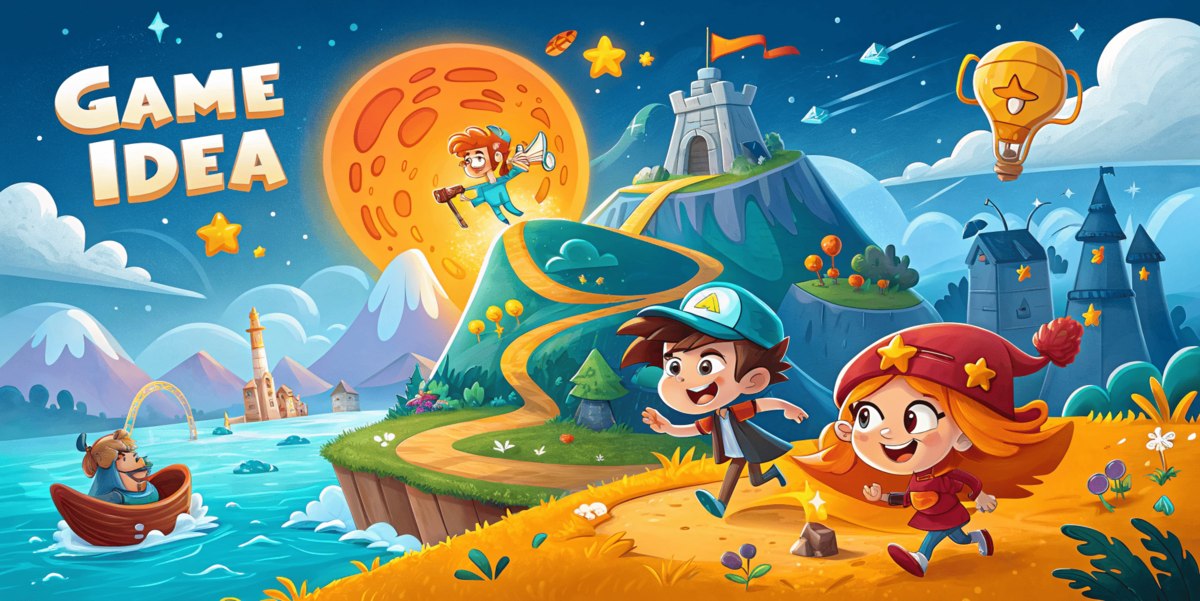
Hey there, fellow gamers and aspiring creators! If you’re reading this on Pink Crow, you’re probably passionate about video games and wondering how to dive into the world of game development. Whether you’re a complete newbie dreaming of building the next big hit or a hobbyist looking to level up your skills, this guide is for you. We’ll explore what game development really means, break down the process, and dive deep into examples of games across various categories. I’ll keep things simple, fun, and straightforward – just like chatting over a cup of coffee about our favorite pixelated adventures.
Game development isn’t just coding; it’s a mix of creativity, tech, and storytelling. In this article, we’ll cover the fundamentals, tools you need, and then get into juicy examples with lists and tables to make it easy to follow. By the end, you’ll have a solid roadmap to start your own project. Let’s jump in!
What is Game Development? A Quick Overview
Game development is the art and science of creating video games. It involves everything from brainstorming ideas to designing characters, writing code, testing for bugs, and finally releasing your game to the world. Think of it as building a virtual playground where players can escape reality.
Why bother with game development? Well, the industry is booming. According to recent stats, the global gaming market is worth billions, and indie developers are making waves with hits like Among Us or Stardew Valley. Plus, it’s incredibly rewarding – you get to turn your wild ideas into interactive experiences.
But let’s be real: it’s not all fun and games (pun intended). It requires patience, learning curves, and sometimes late nights debugging. The good news? With free tools and online resources, anyone can start today.
The Core Stages of Game Development
Every game goes through similar phases. Here’s a simple breakdown:
- Conceptualization: This is where the magic begins. You brainstorm ideas, define the game’s genre, story, and mechanics. Ask yourself: What makes this game unique? Who is the target audience?
- Pre-Production: Sketch out designs, create prototypes, and plan the tech stack. Tools like paper sketches or basic software help here.
- Production: The heavy lifting – coding, art creation, sound design, and level building.
- Testing: Playtest for bugs, balance gameplay, and gather feedback.
- Post-Production and Release: Polish, market, and launch. Then, update based on player input.
Sounds straightforward? It can be, especially with modern engines.
Essential Tools and Skills for Game Developers
To get started, you don’t need a fancy degree – just curiosity and the right tools. Let’s list out some must-haves.
Programming Languages for Game Dev
- C#: Great for Unity engine. Easy to learn if you’re coming from Java or C++.
- C++: Powers Unreal Engine. More complex but offers high performance for AAA games.
- Python: Perfect for scripting in tools like Godot or even full games with Pygame.
- JavaScript: Ideal for web-based games using frameworks like Phaser.
If you’re a beginner, start with something visual like Scratch or Construct 3 – no coding required!
Popular Game Engines
Game engines are like your toolkit. They handle the boring stuff so you can focus on creativity.
| Engine | Best For | Pros | Cons | Examples of Games |
|---|---|---|---|---|
| Unity | 2D/3D mobile and PC games | Free for starters, huge asset store, cross-platform | Can be resource-heavy for big projects | Among Us, Pokémon GO |
| Unreal Engine | High-end 3D games | Stunning graphics, Blueprint system for no-code | Steep learning curve | Fortnite, Gears of War |
| Godot | Open-source 2D/3D | Completely free, lightweight, GDScript is Python-like | Smaller community | Celeste (inspired similar engines) |
| RPG Maker | RPGs obviously! | Drag-and-drop for stories | Limited to RPG genre | To the Moon, Yume Nikki |
These engines make development accessible. Unity, for instance, has tutorials everywhere on YouTube.
Art and Sound Tools
- Art: Blender (free 3D modeling), Aseprite (pixel art), or GIMP (free Photoshop alternative).
- Sound: Audacity for editing, or free libraries like freesound.org.
Skills-wise, learn version control with Git, understand game design principles (like flow and balance), and practice teamwork if you’re collaborating.
Now, let’s get to the exciting part: examples of games by categories. I’ll categorize them, explain what makes each category tick, and provide lists and tables of iconic examples. This will help you see patterns and inspire your own creations.
Exploring Game Categories: Action Games
Action games are all about fast-paced gameplay, reflexes, and adrenaline. They often involve combat, platforming, or shooting. Developing an action game means focusing on tight controls, responsive physics, and engaging levels.
Key Elements in Action Game Development
- Mechanics: Jumping, dodging, attacking.
- Challenges: Enemies with AI, time limits.
- Examples: Think Super Mario for platformers or Doom for shooters.
Here’s a list of sub-categories within action:
- Platformers: Jumping between platforms.
- Shooters: First-person or third-person gunplay.
- Beat ’em Ups: Hand-to-hand combat.
Table of Famous Action Games
| Game Title | Sub-Category | Developer | Release Year | Why It’s Iconic | Development Tip |
|---|---|---|---|---|---|
| Super Mario Bros. | Platformer | Nintendo | 1985 | Simple yet addictive levels | Use tile-based maps for easy level design |
| Doom | FPS (First-Person Shooter) | id Software | 1993 | Pioneered 3D shooting | Focus on enemy AI patterns |
| Street Fighter II | Fighting | Capcom | 1991 | Competitive multiplayer | Balance character movesets carefully |
| God of War (2018) | Action-Adventure | Santa Monica Studio | 2018 | Epic storytelling with combat | Integrate narrative into gameplay seamlessly |
| Celeste | Platformer | Extremely OK Games | 2018 | Precision jumping with emotional story | Add accessibility options like assist modes |
These games show how action can evolve. For instance, Celeste started as a jam project and became a hit by emphasizing mental health themes alongside tough platforming.
If you’re developing an action game, start small: Prototype a single level in Unity. Test controls obsessively – bad input can ruin the fun.
Adventure Games: Storytelling at Its Best
Adventure games prioritize exploration, puzzles, and narrative over action. They’re like interactive books. Development here involves scripting dialogues, creating branching stories, and designing worlds to explore.
Why Adventure Games Rock
They appeal to players who love immersion. Classics like Myst set the bar with point-and-click mechanics.
Sub-categories:
- Point-and-Click: Clicking to interact.
- Text-Based: Like old-school Zork.
- Open-World: Free exploration.
List of Must-Play Adventure Games
- The Legend of Zelda: Breath of the Wild – Open-world exploration with physics puzzles.
- Monkey Island Series – Humorous point-and-click with witty dialogues.
- Life is Strange – Choice-based narrative about time travel.
- Firewatch – Walking simulator with deep story.
- Detroit: Become Human – Branching paths based on decisions.
Table Comparing Adventure Games
| Game | Focus | Engine Used (or Similar) | Player Choices Impact | Development Insight |
|---|---|---|---|---|
| Zelda: Breath of the Wild | Exploration | Custom Nintendo Engine | High – World reacts to actions | Use procedural generation for vast worlds |
| The Walking Dead (Telltale) | Narrative | Telltale Tool | Very High – Endings vary | Script multiple branches early |
| Myst | Puzzles | HyperCard (original) | Medium – Puzzle solving | Create non-linear puzzles |
| Uncharted Series | Action-Adventure | Naughty Dog Engine | Low – Linear story | Blend cinematics with gameplay |
| Outer Wilds | Space Exploration | Unity | High – Knowledge-based progression | Design loops where discovery is key |
Adventure games teach us that story is king. When developing, use tools like Twine for prototyping narratives without code.
RPGs: Role-Playing Games for Deep Immersion
Role-Playing Games (RPGs) let players embody characters, level up, and make choices that shape the world. Development involves stats systems, inventory management, and complex quests.
RPG Development Basics
- Character progression: Experience points, skills trees.
- World-building: Maps, NPCs with dialogues.
- Combat: Turn-based or real-time.
Sub-categories include JRPGs (Japanese-style like Final Fantasy) and WRPGs (Western like Skyrim).
Bullet List of RPG Elements to Include
- Quests: Main and side stories.
- Customization: Gear, abilities.
- Morality Systems: Good/evil paths.
- Multiplayer: Co-op or MMO.
Table of Iconic RPGs
| Game | Type | Developer | Key Feature | Why Develop Similar? |
|---|---|---|---|---|
| The Elder Scrolls V: Skyrim | Open-World WRPG | Bethesda | Modding community | Endless replayability via mods |
| Final Fantasy VII | JRPG | Square Enix | Emotional story | Focus on character development |
| The Witcher 3: Wild Hunt | Action RPG | CD Projekt Red | Branching narratives | Rich lore and side quests |
| Pokémon Series | Monster-Collecting RPG | Game Freak | Collection mechanics | Add trading for social features |
| Mass Effect Trilogy | Sci-Fi RPG | BioWare | Dialogue wheels | Player agency in relationships |
RPGs can be massive, so scope your project: Start with a short story RPG in RPG Maker.
Puzzle Games: Brain Teasers and Logic
Puzzle games challenge the mind with problems to solve. They’re often minimalist, focusing on clever mechanics rather than graphics.
Developing Puzzles
- Ensure fairness: Hints if stuck.
- Variety: Mix types to avoid repetition.
- Progression: Increasing difficulty.
Examples span from match-3 to physics-based.
Numbered List of Puzzle Game Ideas
- Match-3: Like Candy Crush – Swap to match.
- Physics: Portal – Use portals for puzzles.
- Logic: Sudoku-inspired.
- Escape Rooms: Find clues to escape.
- Word Puzzles: Crosswords in game form.
Table of Puzzle Game Examples
| Game | Mechanic | Developer | Platforms | Dev Tip |
|---|---|---|---|---|
| Portal | Physics/Portals | Valve | PC/Console | Test puzzles with friends for balance |
| Tetris | Block Stacking | Alexey Pajitnov | Everywhere | Simple rules, endless depth |
| The Witness | Line-Drawing Puzzles | Thekla Inc. | PC/PS4 | Open-world puzzle integration |
| Monument Valley | Optical Illusions | ustwo games | Mobile | Use art to enhance puzzles |
| Baba Is You | Rule Manipulation | Hempuli | PC/Switch | Allow players to break rules creatively |
Puzzle games are great for mobile devs – quick sessions, addictive loops.
Strategy Games: Planning and Tactics
Strategy games require foresight, resource management, and decision-making. Sub-types: Real-Time (RTS) like StarCraft, Turn-Based like Civilization.
Strategy Dev Keys
- AI opponents: Smart but not cheating.
- Balance: Units and economies.
- Multiplayer: Online matches.
List of Strategy Sub-Categories
- RTS: Fast-paced building and battling.
- TBS: Turn-based planning.
- Tower Defense: Defend against waves.
- 4X: eXplore, eXpand, eXploit, eXterminate.
Table of Strategy Classics
| Game | Sub-Type | Developer | Unique Twist | Why It’s Great for Devs |
|---|---|---|---|---|
| StarCraft II | RTS | Blizzard | Three races with asymmetry | Esports potential |
| Civilization VI | TBS/4X | Firaxis | Historical leaders | Procedural maps for replay |
| Plants vs. Zombies | Tower Defense | PopCap | Humorous theme | Easy to prototype waves |
| Age of Empires II | RTS | Ensemble Studios | Historical campaigns | Resource gathering mechanics |
| XCOM 2 | Turn-Based Tactics | Firaxis | Permadeath | High tension decisions |
Strategy games shine in depth – use code for simulations.
Simulation Games: Mimicking Real Life (or Not)

Simulations recreate systems, from life sims to flight sims. Development: Accurate models, emergent gameplay.
Sim Types
- Life Sims: The Sims.
- Management: SimCity.
- Vehicle: Euro Truck Simulator.
Bullet List Examples
- The Sims 4: Build lives, homes.
- Stardew Valley: Farming sim with RPG.
- Kerbal Space Program: Physics-based space.
- Cities: Skylines: City building.
- Flight Simulator: Realistic flying.
Table of Sim Games
| Game | Focus | Developer | Realism Level | Dev Insight |
|---|---|---|---|---|
| The Sims | Life | Maxis | Medium | AI for character behaviors |
| Stardew Valley | Farming | ConcernedApe | Low (Pixel Art) | Solo dev success story |
| Kerbal Space Program | Space | Squad | High Physics | Procedural failures for fun |
| RollerCoaster Tycoon | Theme Park | Chris Sawyer | Medium | Economic simulations |
| Animal Crossing: New Horizons | Island Life | Nintendo | Low | Social and seasonal events |
Sims allow creativity – add mods for longevity.
Horror Games: Scares and Atmosphere
Horror thrives on tension, jumpscares, and psychology. Dev: Sound design, lighting, pacing.
Horror Elements
- Atmosphere: Dark, eerie.
- Mechanics: Limited resources.
- Narrative: Twists.
List of Horror Hits
- Resident Evil: Survival horror.
- Silent Hill: Psychological.
- Amnesia: No combat, just run.
- Outlast: Found-footage style.
- Dead Space: Sci-fi horror.
Table of Horror Examples
| Game | Style | Developer | Fear Factor | Tip for Devs |
|---|---|---|---|---|
| Resident Evil 2 Remake | Survival | Capcom | High – Zombies | Inventory tension |
| PT (Playable Teaser) | Psychological | Kojima Productions | Extreme | Looping hallways |
| Five Nights at Freddy’s | Jump Scares | Scott Cawthon | High | Camera mechanics |
| Alien: Isolation | Stealth Horror | Creative Assembly | AI Alien | Unpredictable enemy |
| Layers of Fear | Walking Horror | Bloober Team | Narrative | Mind-bending visuals |
Horror is about build-up – test on scared friends!
Sports and Racing Games: Competition and Speed
These simulate sports or driving. Dev: Physics engines, multiplayer.
Types
- Racing: Need for Speed.
- Sports: FIFA.
Numbered List
- Gran Turismo: Realistic racing.
- Rocket League: Car soccer.
- NBA 2K: Basketball sim.
- Tony Hawk’s Pro Skater: Skateboarding.
- Wii Sports: Motion controls.
Table
| Game | Sport/Type | Developer | Multiplayer | Dev Note |
|---|---|---|---|---|
| Forza Horizon 5 | Open-World Racing | Playground Games | Yes | Dynamic weather |
| FIFA 23 | Soccer | EA | Online Leagues | Player stats accuracy |
| Rocket League | Car Sports | Psyonix | Cross-Play | Physics fun |
| Madden NFL | American Football | EA | Franchise Mode | AI playcalling |
| Dirt Rally | Rally Racing | Codemasters | Realistic | Handling simulation |
Great for competitive devs.
Indie vs. AAA: Lessons from Examples
Indies like Hollow Knight (Metroidvania) show small teams can compete with AAA like Cyberpunk 2077.
Tips for Aspiring Game Developers
- Start small: Game jams.
- Learn from failures.
- Build a portfolio.
- Network on itch.io or Reddit.
- Monetize: Steam, mobile stores.
Conclusion: Your Game Dev Journey Starts Now
Game development is accessible and thrilling. With examples from action to sims, you’ve got inspiration galore. Head to Pink Crow for more tips, and remember: Every great game started as an idea. What’s yours?



